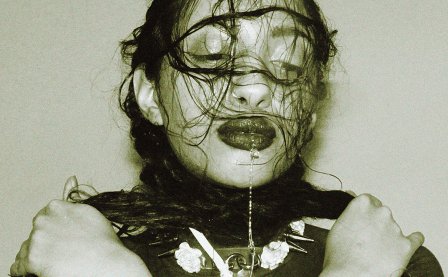To avoid tropes, through language, what can’t be avoided.
Nothing begins, no screen is raised, the words go up in flames.
Can a cliché, can a tale as old as time, can the experience of failure.
Yes, for some time, all she did outside of work was watch films in bed.
One day, with a little water, the BRD trilogy back to back.
One day Jeanne Dielman, 23, quai du commerce, 1080 Bruxelles.
The day after that, she shook a pencil skirt off the rack.
She put on a cardigan and styled her hair into a low bun.
She sat at the kitchen table with her back straight against the hard chair.
She folded-up used parchment paper to be reused at a later date.
That date never came, the gripping feeling passed, the parchment paper, brittle now, fell apart.
SADAF tells a story of collapse and intentional erasure.
Failure, but a self-assigned failure, and the space to fail.
The story is of a scriptwriter who composes a screenplay that they cannot, or will not, release.
SHELL opens with the statement, “OK, I wrote a film, and now I want to burn it.”
Immediately, the story launches and we are launched as a listener.
Immediately, our attention is forced on, no easing in.
The trope of the chair, gripping it, eyes growing wide with each passing scene.
Paying attention to what comes off the top of her head.
SADAF composed SHELL by improvisation, and this is how this story is told.
It feels so natural, shockingly, because it’s actually so close to what we know.
A story told, to a friend, to oneself, is not rehearsed.
Off of our heads, we tell and tell, remember, backtrack, sequence each detail.
Some people are better storytellers than others; the way they develop context, suspense, exercise timing.
SADAF is a great one, broad and probing.
She articulates moments and steps back to let them breathe in our imagination.
In “OK, I wrote a film,” the narrator says, “Walking down the street in closeup, up the stairs, wide shot, dress gets snagged on the railing of the stairs.”
The dress is red, that detail was dropped earlier.
When the gun is shown, the gun will be used, eventually, a classic idea, through new classical means.
Scenes appear multivalent and in montage, and the focus alternates between crisp to overexposed.
The narrator speaks of a man making coffee in the kitchen. Who is the man? Who is she?
The whole of SHELL invites this kind of questioning, asks, “Is this torture, is this fear? Is this torture? Is this fear?”
Torturing the tropes of pop, I become fearful that something might go missed, a crucial detail to the plot.
SADAF obfuscates toward the total story, hers, and we see what we see.
Narrator states that they are “Burning the words, but not the images.”
In the third part, “I Don’t Own Anything,” it feels like the script may be speaking back.
SADAF’s singing voice changes from low and direct to high and childlike, or like a ghost.
This new character asks, “Am I dead now? Am I dead now?”
Yes, you are dead, because what cannot be said in the screenplay comes out, after the fact, from its shell.
It could not be said there, because the screenplay was too composed.
The script cannot be because its desire is its economy.
The script is something to be sold, acted, produced, directed, and perhaps this is the discomfort of its realization and the origin of its destruction.
“Am I suffocating you? Because you’re suffocating me,” says one to the other, and back again.
The script’s edifice suffocates into nothingness, and after nothingness, we can once again explore.
SADAF explores the possibilities of her own story, takes other directions, circles back.
Went to see a film, what was it about?
It’s about swiveling your brain around on a chair, your affectations.
It’s about making it up as you go, flushing your diary.
It’s about going to the post office, coming back, taking a shower, swimming around in it.
It’s about bags and bags of stuff and lighting little fires.
It’s about sound used as sound effects affecting emotion, diegetic and non -alike.
It’s about a script as stiff as ice, clicking a lighter on and off, swiping a match.
It’s about not having a penny to your name, whose name, what name, my dear.
It’s about her walking toward him, walking past him, having nothing to say.
It’s about writing a film, extending the truth, making a fiction of you.
It’s about a woman looking at her feet.
More about: SADAF




